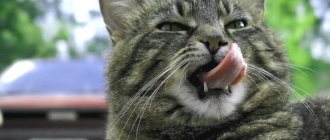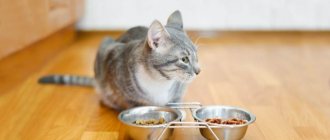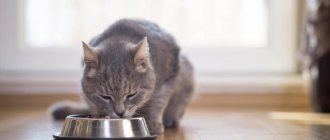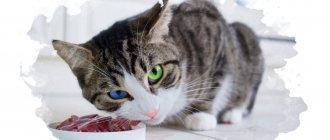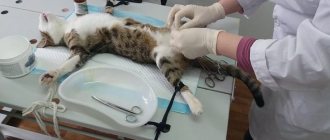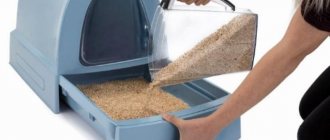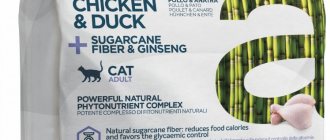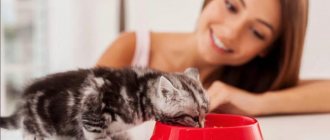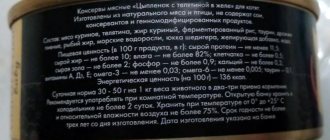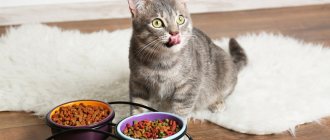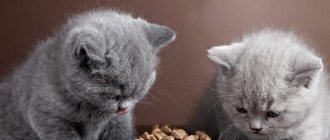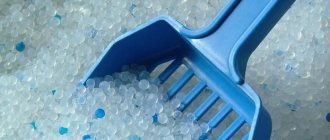Basic nutritional features
In the wild, Bengal cats feed mainly on rodents and marsupials. These “products” can be replaced at home with different types of meat. For this breed, it is important that at least 70% of the total portion is meat.
The raw product is more beneficial for the animal. Since the likelihood of becoming infected with parasites from eating raw meat every day is very high, it is important to first freeze the meat in the freezer for at least 5 days.
Food for animals should be as fresh as possible. If the portion for your pet turns out to be too large and not finished, it should be thrown away and not left “for later.” All dishes should be neither hot nor cold. It is necessary that the food is at room temperature. Before giving meat from the freezer to the cat, it is recommended to pour boiling water over it and cut into small pieces.
The pet must know its place for feeding, as well as meal times. It is not allowed to give any snacks in response to an animal's begging.
Bengal cats can eat both natural products and ready-made premium commercial diets. It is not recommended to combine dry food with canned food or raw meat.
Veterinarian advice on feeding Bengals
- Kittens need to be fed in small portions, 6 times a day.
- An adult animal should eat a small portion of food at a time.
- When choosing food for your pet, consider not only the composition, but also the expiration date.
- If your pet doesn't eat, throw away the remaining food. It might go bad.
- Sprinkle meals at intervals to give your digestive system a chance to prepare for your next meal in advance.
- If you give your cat dry food, you should completely exclude natural food. Combining two feeding options can negatively affect the functioning of the digestive tract.
The following are strictly prohibited for consumption by Bengal cats:
- Bones - because of them, a pet can choke; solid particles damage the stomach and clog the intestines.
- Fatty and fried foods can cause gastrointestinal upset and disrupt metabolism.
- Sweets lead to dental diseases, a weakened immune system and metabolic disorders. Particularly dangerous products include chocolate, which contains theobromine, which is dangerous for pets even in small quantities.
- Medicines and vitamins intended for humans - a cat can be poisoned, the flesh can be fatal.
You should not give your animal onions and garlic, raisins and grapes, or spinach. It is advisable not to indulge your pet’s desire to feast on human food, even if he is accustomed to eating “natural” food.
Diet
As a rule, representatives of the breed are not prone to excess weight. When creating a diet, you should also not forget about the anatomically shortened intestines, which means rapid digestion of food. The optimal number of meals is calculated according to the age of the pet:
- up to 1 month – upon request;
- 1-2 months – 5-6 times a day;
- 2-3 months – 4-5 times;
- 4-5 months – 3-4 times a day;
- from 6 months and adults – 2 times a day.
How to choose food for a Bengal cat
When choosing wet or dry food for Bengal cats, it is important to pay attention not only to the manufacturer and class of the product, but also to the age of the animal.
For adult cats, meat must be included in their diet. The Bengal's stomach is shortened, so the animal cannot eat only plant foods. Food for adults should be presented in the form of large granules to prevent diseases of teeth and gums.
The diet of Bengal kittens will be different. From birth, they are completely dependent on their mother, as they feed on her milk. Already at the age of 1 month this is not enough. From 1-1.5 months you need to introduce the first foods into the kitten’s diet. Since the baby’s gastrointestinal tract is not yet accustomed to digesting solid foods, it is recommended to choose wet and soft food.
What to feed a Bengal kitten
Like other cat breeds, Bengal cat babies must be fed exclusively on mother's milk for the first 4-5 weeks of their lives. At this stage, it is quite enough to obtain the necessary useful elements. For the mother cat herself during this period, special ready-made premium or holistic foods are more suitable.
From the first month of life, little “predator leopards” can already try some natural products. Experienced veterinarians recommend taking thawed and chopped meat, high-quality homemade minced meat or meat porridge cooked in water as the first complementary food.
Over time, you can offer kittens larger pieces of meat. As an option, you can use delicate ready-made pates and mousses that are made for animals of this age.
The second optimal product for complementary feeding is cottage cheese. Since it can be difficult for a baby to swallow, it is worth diluting it with low-fat milk or homemade yogurt. The animal should be accustomed to vegetables last.
Bengal cats must eat kitten food until they are 8-12 months old. After a year, they can switch to adult food.
What ready-made food to feed
Take food labeled “for kittens” or “for kittens and lactating, pregnant cats.”
I recommend Royal Canin 34 - for kittens up to four months. This food can be fed to a kitten even up to 7 months.
Sanabelle Kitten is a good food for kittens up to 1 year old.
Do not mix ready-made food with natural food. There should be a separate bowl for each food. Give premium food, do not feed Bengal kittens with cheap food.
Kittens eat well wet food and canned food: Royal Canin Babycat Instinctive pate, Purina, Pro Plan, Brit, Iams.
Ready-made food suitable for Bengal kittens
In pet stores you will find a wide range of food and quickly solve the problem of what ready-made food to feed your Bengal kitten.
Hill's SP Feline Kitten Chicken Canned Kitten Chicken (85 g)
Price: 83 rub.
106 rub.
22% discount for you!
100% guarantee of quality, consistency and taste. Fast delivery throughout Russia. And also more than 3,000 other pet products at competitive prices! Take a look!
Natural food for an adult Bengal cat
Some owners prefer natural feeding. When preparing daily dishes for your Bengal, it is important to consider that the following products should be present in his diet:
- Meat . The optimal daily volume of meat is 60-65% of the total volume. A lack of proteins and other substances necessary for the normal development and growth of a pet occurs when the meat volume decreases to 40-45%. Pre-frozen and then scalded pieces of raw meat are ideal for Bengals - for example, chicken, rabbit, veal, chicken necks.
- Offal . With great pleasure, Bengal cats eat raw hearts, gizzards, tripe, kidneys and lungs. They, like meat, must first be frozen in the freezer and then scalded in boiling water.
- Fish . Allowed once a week. It is recommended to give preference to sea fish, previously boiled and deboned.
- Dairy and fermented milk products . Adult Bengals are happy to try cream with a fat content of up to 20%, as well as low-fat yoghurts, fermented baked milk, kefir and cottage cheese.
- Eggs . Bengals refuse boiled eggs. Therefore, the best option for them would be raw quail egg yolks. They can be given no more often than 1-2 times every 7 days.
- Vegetables . The share of vegetables in the total serving should be no more than 20%. Carrots, zucchini, beets, and sweet peppers are allowed to be given both raw and boiled.
- Cereals . They will be an excellent addition to the diet, but their norm should be limited to 5-7% of the total serving per day.
- Greenery. Added to dishes (porridge, minced meat) as an additional source of vitamins: spinach, lettuce, sprouted grass.
Natural feeding of a Bengal cat should be supplemented by periodic intake of mineral and vitamin complexes, since it is impossible to fully compensate for the lack of beneficial minerals from food.
Feeding newborns and very young cats
Newborn kittens are almost never sold, because they are very difficult to care for and feed. This burden falls entirely on the kitten's mother. She will do the best job feeding a young Bengal.
The cat feeds very small Bengals
If there is no cat, but the kitten still comes to you, then you will have to watch it especially closely. You need to feed a kitten that is not even a month old with milk. Special mixtures and cat milk substitutes work well. I can recommend “KITTY-MILK” from Beaphar.
KITTY-MILK
The same powder can be used for additional feeding of kittens that feed on mother's milk. Many experts consider this substitute to be one of the best. Feed should be strictly according to the instructions.
Kittens from 1 to 4 days should be given 30 ml. mixtures per day per 100 grams of their weight.
When your pets are 5-13 days old, you can give them 38 ml. mixture per 100 grams of their weight, thereby gradually increasing the dose of nutrients.
What to feed a Bengal kitten who is two months old
Once they reach two months, kittens are fed more than just milk. An excellent option would be to start feeding him what is natural for him in nature - meat. But it needs to be prepared in a certain way, so as not to harm the kitten. At first, it is better to boil the meat, then cut it into very small pieces.
But in nature, no one cooks meat for cats, so you can give raw meat, in which case it will need to be frozen for a long time. At first, it’s better to play it safe and leave it in the refrigerator for several days or weeks. Then a thin layer is removed from the meat using a knife. The resulting shavings are doused with boiling water and given to the kitten.
Bengal at 2 months
Another good option would be porridge with meat, for example, rice. It should be given with plenty of water or milk. The finished product should resemble a thick substance.
The best ready-made diets
Having analyzed the cat food market, veterinary specialists and breeders have identified the most optimal production rations that best satisfy the needs and characteristics of purebred representatives.
- WildCat Etosha . Dry natural food from a German manufacturer. Belongs to the category of holistic products, that is, the most balanced products. It is distinguished by its high protein content (approximately 46%) and the presence of flaxseeds.
- Orijen Six Fish Cat . Canadian food based on fish products. Rich in proteins. Also includes vegetables, fruits, grain products.
- CARNILOVE Salmon for Adult Cats . This food is made by a Czech manufacturer. Created specifically for those breeds of cats that are as close as possible to their predatory ancestors. 36% consists of crude protein.
- Royal Canin Bengal Adult . Premium product from a French company. Ideal for Bengals over one year of age. 40% consists of proteins.
- Eukanuba Adult with Chicken . Quality product from the Netherlands. It is high in protein and also includes fatty acids and probiotics.
Ready-made foods are also great for small kittens, for example, from Brit Care, Fitmin For Life, Leonardo, Summit.
If the owner has opted for finished products, it is important to ensure that the pet has constant access to fresh water. In addition, the owner should not feed the Bengal with vitamins, since food from the holistic and super-premium categories contains the daily requirement of all minerals. Otherwise, hypervitaminosis will occur, which causes discomfort and discomfort in the pet.
